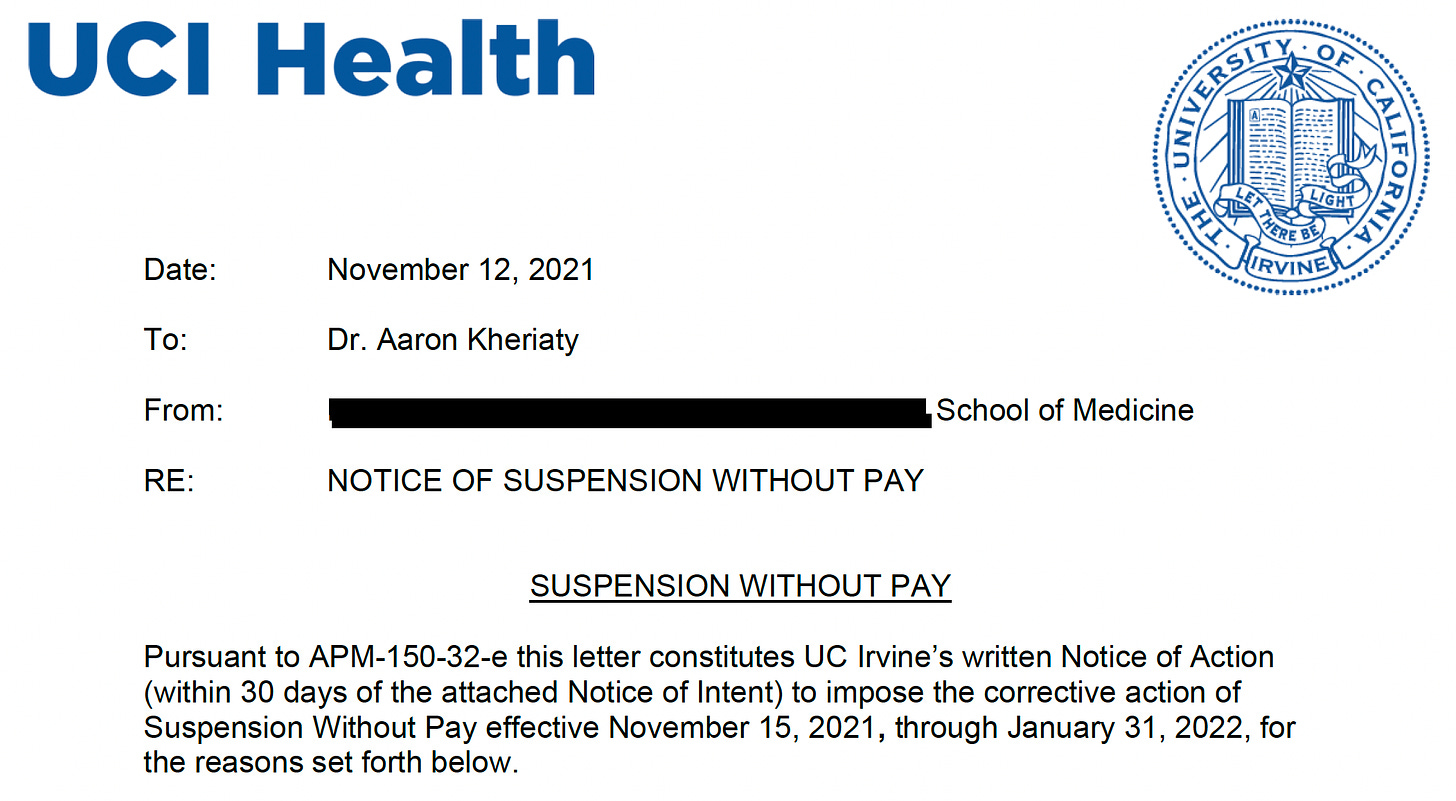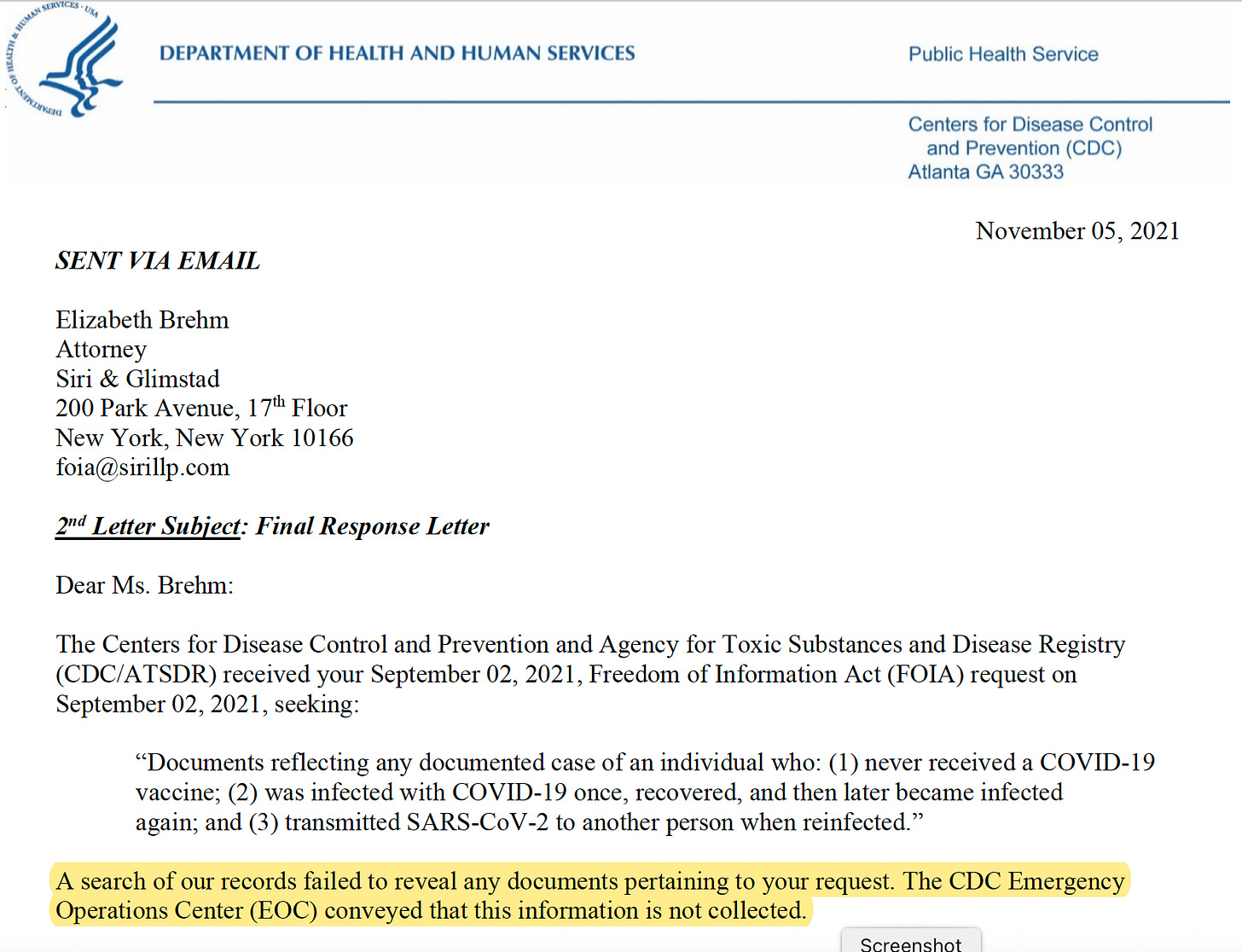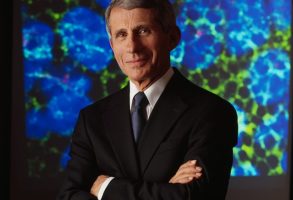
Published November 13, 2021
(This post originally appeared in Aaron Kheriaty’s Substack newsletter “Human Flourishing.” Read other issues and subscribe to the newsletter here.)
My lawyer and I received two letters of interest this week. It’s instructive to examine them side-by-side. First, my letter from the University of California Friday informing me that as of Monday I will be placed on suspension without pay:

The letter goes on to explain the reason for this action: “Your failure to comply with the [vaccine mandate] while continuing to physically access UC health care facilities could have serious adverse consequences for individuals and the University, including in terms of health and safety of the community.” What these serious adverse consequences for individuals and the University in terms of health and safety of the community might be the letter does not explain. Presumably, the University is concerned that my noncompliance with the vaccine mandate might increase the risk to individuals and the community of me getting re-infected with Covid and transmitting it to others. The letter concludes by saying that if I remain out of compliance with the vaccine mandate by the end date of my suspension, then “it is anticipated you will receive a Notice of Intent to terminate your appointment.” Clear enough.
Perhaps we can turn to the CDC for clarification regarding the risks I might pose to the health and safety of the community, and thus, to clarify the rational basis for the vaccine mandate in my case. My lawyers, Aaron Siri and Elizabeth Brehm, submitted a Freedom of Information Act request to the CDC, which I described at length in a previous post. Siri and Brehm finally got a response from the CDC to one of their requests—a reply which is quite interesting:

The case described herein of an individual who “(1) never received a COVID-19 vaccine [and] (2) was infected with COVID-19 once” perfectly describes my situation. The outcome of concern, namely, that such an individual might “then later became infected again; and (3) transmitted SARS-CoV-2 to another person when reinfected,” is precisely the situation that the University presumably wants to avoid in my case.
The CDC admits here that they have no documented evidence of a single person with natural immunity getting reinfected and transmitting the virus. It’s noteworthy that we claimed in our lawsuit against UC that such a case has never been documented, in stark contrast to the tens of thousands of cases of vaccinated individuals getting breakthrough infections and transmitting the virus (see studies here. here. here. and here, just to mention a few). Now, it is normally quite risky to make such a bold claim in a lawsuit, since one single counterexample case is sufficient to refute the claim. But after a thorough search of the research literature, we were confident that the claim was true. In their response, the University’s experts could not find such a case to refute our claim. And based upon the letter above, neither can the CDC.
What is more, the CDC’s response indicates that they make no attempt to even collect such information. Which means that their policy recommendation for vaccinating individuals with natural immunity—on the presumption that they need vaccination to protect others—not only lacks the tiniest shred of data to support it, but the CDC shows no interest in even attempting to collect such data.
Nevertheless, all the vaccine mandates that ignore natural immunity, including the UC mandate, rely on this CDC recommendation as their foundation. So thousands of like me are losing our jobs, presumably because we put “the health and safety of the community” at risk, with not one iota of evidence that we in fact pose any such risk, and plenty of available evidence (some of which I have summarized in previous posts) that we do not in fact pose such a risk. At the very least, the risk I pose to the community is far, far, far less than that of vaccinated individuals who have not recovered from Covid. Yet the latter can keep their jobs whereas I will soon lose mine.
Glad we cleared that up.
Aaron Kheriaty is a fellow at the Ethics and Public Policy Center, where he directs EPPC’s program in Bioethics and American Democracy.
Aaron Kheriaty, MD, is a Fellow & Director of the Program in Bioethics and American Democracy at the Ethics and Public Policy Center. He is a physician specializing in psychiatry and author of three books, including most recently, The New Abnormal: The Rise of the Biomedical Security State (2022).











